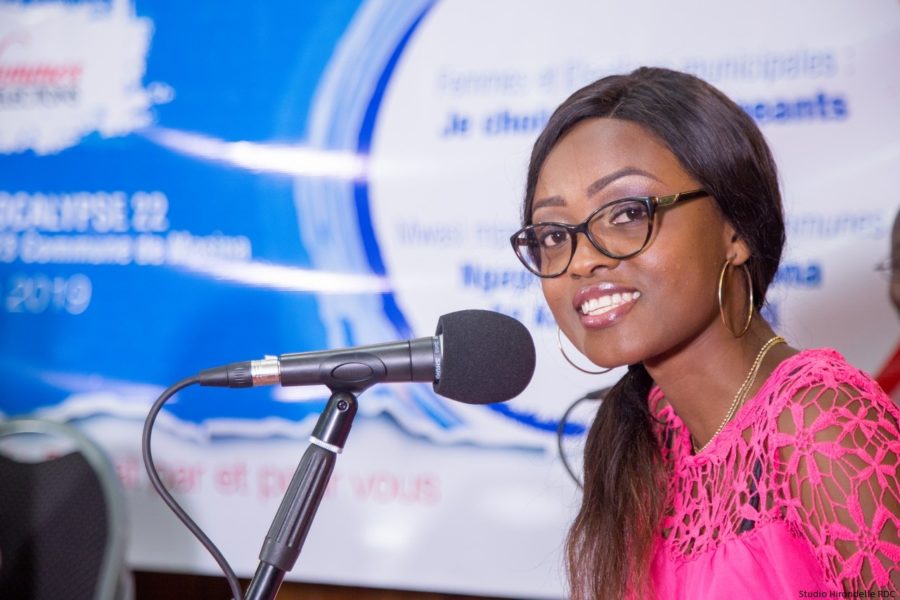A church hall full of women farmers eager to debate elections in central Africa. Unlikely? Not if you listen to the Democratic Republic of Congo’s Nathalie Sala who works with the Fondation Hirondelle to create the kind of radio programmes that urge women to vote and get more involved in politics in the second largest country in Africa. In a guest blog for the Foreign Office she talks about helping women turn disappointment with politicians into participation – and fighting for her dreams.
TV dreams
By the time I was 12 or 13 I’d already decided I wanted to go into TV. I used to spend Sundays glued to the TV watching music shows. What I really noticed was how at ease some of the presenters were in front of the camera. I could see that they loved their work. I used to watch French TV anchor Patrick Poivre d’Arvor and dream about being his female equivalent in my own country. My late father made sure that I had the means to study at IFASIC (the DRC’s leading journalism school), which I did for five years.
A platform so women can speak freely
I’ve worked as a content producer for the Fondation Hirondelle since 2016. One of our focuses has been on women during election periods. We try to emphasise to women how important it is that they get involved in the electoral process, whether that’s as candidates or as voters. We hold public debates in which we give women a platform so that they can speak freely and share their experiences. Ahead of the elections in December last year (and thanks to funding from the UK and Sweden) the Fondation Hirondelle started a programme called Medias Citoyens pour la Participation a la Vie Politique. That programme has allowed us to really delve into the Women in Elections topic. The Democratic Republic of Congo will be going to the polls again this year for local elections so we’re keeping up our focus on encouraging women to get involved in electoral processes.
“You could just feel the energy in the room”
I was in Mbankana with the Fondation Hirondelle team in November. Mbankana is a small town about 100 km from Kinshasa. We’d decided to hold a live debate, which my colleague Caleb Kazadi and I were to moderate. We had two female experts taking part. Thirty minutes before the debate kicked off the church hall we were using was already full. Women in this area – and most are farmers – had decided to take a break from their work for two hours so they could attend. I have to say that I was worried the discussion might be stilted and that my colleague and I would have to work hard to help the women get over their embarrassment and speak up. That’s not what happened! I was so encouraged by these women’s willingness to participate. Their memories of what happened in elections in 2006 and 2011 were very clear. They’d been disappointed by politicians who hadn’t fulfilled their campaign promises. They were fed up and they wanted to express that. You could just feel the energy in the room!
Determined to make their voices heard
The female experts we’d brought with us really encouraged these women to go out and vote. And I can say that by the end of the debate, these women had decided en masse that they weren’t going to get side-tracked [in the forthcoming elections] by handouts or tribalistic arguments. What they wanted in their political candidates were men and women who understood what ordinary women were going through and who could speak up for them. That whole debate was a very positive experience.
There are still people in the DRC who think that women don’t understand a thing about elections and that they shouldn’t get involved because it’s “men’s business”…But women keep on fighting to change those perceptions, whether they’re part of civil society or already active in politics. Many of the women I meet are determined to make their voices heard.
Still new things to learn
When I started off as a journalist, I realised that there was a huge gap between the media theory I’d been taught and what was required of me on the ground. I realised that it was up to me to get up to speed with new techniques and produce the kind of content that my employer wanted. Even today, I know that despite all my experience, there will still always be new things to learn. I think the best way of helping journalists who are just starting out is to believe in them and show them that they’re going to have to fight tooth-and-nail to reach their full potential.

